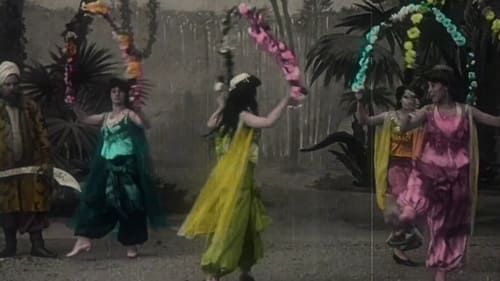Canon (1964)
Género : Animación
Tiempo de ejecución : 10M
Director : Norman McLaren, Grant Munro
Sinopsis
Perhaps the only film whose content is totally based on the musical form known as canon. The first sequence is a simple demonstration of the canon "Frere Jacques" where four cubes dance and combine with one another on a checkerboard. The second sequence show four little human-like figures dancing in space. The third and most elaborate sequence shows a human going through several strange gesticulations. Through multiple printing we realize that the man, as in the previous sequences, is part of a visual canon and is making the gestures to himself. As we hear variations on the canonic theme so too do we witness visual variations: a woman and cat enters the canon. To show the musical technique of inversion, the image of the man is printed upside down.

A green crocodile who loves flowers and leaves falls in love with a pretty cow.

A self-consciously Kafkaesque tale of a winged lonely man literally devoured by totalitarian rule.

Various animated depictions of movement, accompanied by different instrumental and ambient sound arrangements.

It is one of the most stirring animated films in the history of animation. In a simple, but powerful way Czekala presents a horror that happened in concentration camps – prisoners’ dread, humiliation and lost humanity. The everyday roll-call ends tragically because of prisoners’ “insubordination” in this black and white film. The Roll-Call crossed borders of what can be presented or not in animation. It is sometimes interpreted as a response to the trend of allegorical and philosophical films that dominated in Polish animation in 1960s.

Motion Painting No. 1 is a 1947 experimental short animated film in which film artist Oskar Fischinger put images in motion to the music of Johann Sebastian Bach’s Brandenburg Concerto no. 3, BWV 1048. It is a film of a painting (oil on acrylic glass); Fischinger filmed each brushstroke over the course of 9 months. In 1997, this film was selected for inclusion in the United States National Film Registry by the Library of Congress as being “culturally, historically, or aesthetically significant”.

A jovial shirtless man attempts to rouse a contingent of lethargic dancers to life in NUDE CABOOSE. His highjinks really get the deadbeats bustin' out until something unusual catches his eye. Dance floor seduction distilled into a fateful moment!

Apparently inspired by the antics of Harry Houdini, Slippery Jim opens in the office of a police commissioner to whom a rather cocky villain is presented. The commissioner orders the prisoner to be clapped in irons, but this proves to be easier said than done because our anti-hero - presumably the Slippery Jim of the title - proves to be an expert escapologist.

A very simple gag film as a young lady substitutes herself for a dummy in order to play a practical joke on an artist.

A descrition of a game between two teams where one of the teams change the rules.

The story of a young deer deceived by appearances, or how a good deed in haste can be the cause of a tragedy.

A sorcerer draws signs on the sand making charming young women.

A little flower film by Gaston Velle.

Through paintings that interact on the principle of Russian dolls, we are drawn along the swirling path of the thoughts of a pilgrim, a solitary walker.

The story of Cinderella is modernised. Cinderella dreams of clouds and ends up fleeing by plane with her Prince Charming. The image is animated simultaneously at various speeds (decor, moving elements, characters) in connection with the sound tape played by Georges Schwizgebel on the piano. It is an intelligent variation on a well-known story with which the viewer can identify

Lonely, old parents living on a small farm look forward to their son's visit. The man finally shows up one day, but he separates himself from his parents with a newspaper. Inadvertently, he drops a slice of bread. His father picks it up respectfully.

In eight minutes, animator Bill Plympton gives us 24 vignettes: seven are clearly about sex, 10 about violence, and seven others deal with human frailties, particularly the body as it ages. There are three stories of persons with confused priorities (including a guy tying his shoe while parachuting); the world's first phone sex; and a clever, if dangerous, way to find a lost key. Except for the titles of each sketch and a couple of jokes that turn on noise, these are visual trips into the psyche of men, women, God, animals, and Time (the enemy of us all).

Between a wave’s rhythm and the breath of a young woman in her sleep, some animated paintings go on modifying each other.

In his experimental short film "Brutalität in Stein" (Brutality in Stone), Alexander Kluge demonstrates how Nazi architecture used dimensions of inhuman and super-human scale to bolster the regime's politics of the same kind. Shots of huge neo-classical architectural structures from the Nazi period are confronted with equally anti-human national-socialist language as a voice-over.

The story is about Harold, an isolated figure in an overwhelming world of totalitarian bureaucracy. Harold tries to find the elusive Joseph Kilian, an old acquaintance, in Prague. When Harold stumbles across a state-run cat-lending store, he impulsively rents a feline for the day. Later, he attempts to return the cat and finds that the store no longer exists. Now with a furry companion, Harold continues his search for Kilian. Written and directed by Pavel Juracek, this 40 minute film effectively aims its allegorical shots at personality cults and the absurdities of a totalitarian regime.

A waltz played with an accordion starts a short story about the running time.







